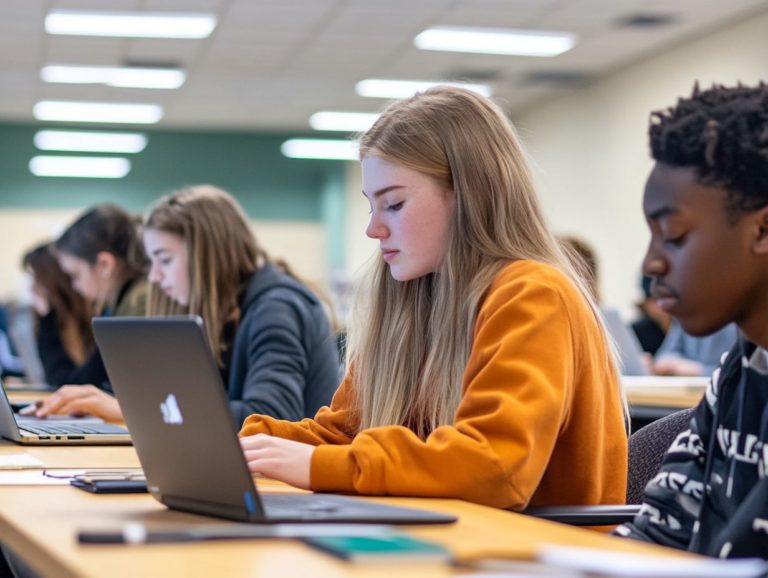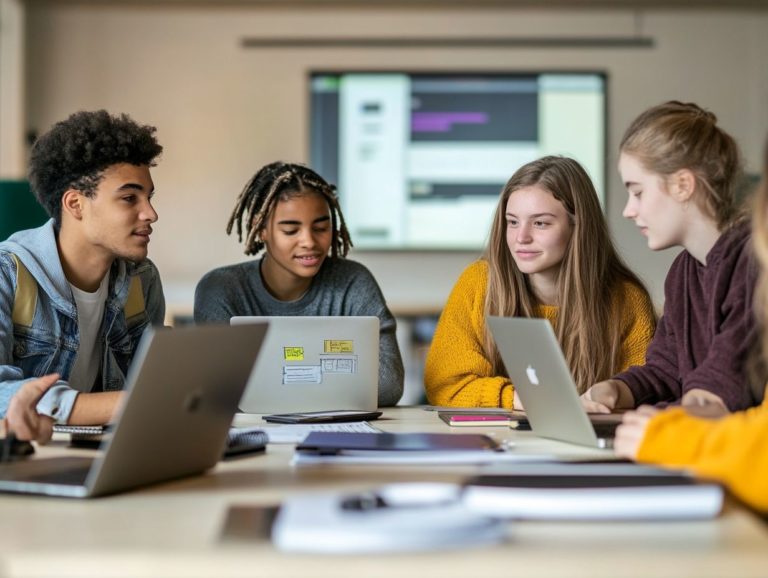Understanding the Role of Faculty in Online Programs
In the rapidly evolving landscape of online education, you play a pivotal role in shaping student experiences and outcomes. Your expertise enhances the curriculum and fosters an engaging learning environment that encourages growth and discovery.
As an online instructor, you face unique challenges. Managing online classes while ensuring student participation can feel like a juggling act. Let s dive into how you can enhance online learning today by exploring your essential contributions, effective strategies for engagement, and best practices for cultivating strong student relationships.
Discover the keys to success in online education and learn how your influence can make a lasting impact.
Contents
- Key Takeaways:
- The Importance of Faculty in Online Programs
- Challenges Faced by Online Faculty
- Effective Strategies for Online Faculty
- Effective Strategies for Faculty-Student Interaction
- Frequently Asked Questions
- What is the role of faculty in online programs?
- Do online faculty have the same responsibilities as traditional classroom faculty?
- How do online faculty communicate with students?
- What qualifications do online faculty typically have?
- What is the importance of faculty-student interaction in online programs?
- How do faculty support student success in online programs?
Key Takeaways:

Online faculty members play a crucial role in the success of online programs by facilitating student learning, engagement, and support. Managing virtual classrooms, ensuring student involvement, and providing personalized support are key challenges faced by online faculty. To be effective, faculty should create engaging course content, facilitate meaningful discussions, and utilize technology for teaching. Building relationships and providing timely feedback to students is also essential.
The Importance of Faculty in Online Programs
Your role as a faculty member is crucial for creating an environment that promotes effective teaching and learning, particularly in higher education.
Engaging in faculty development initiatives, along with strategic course development and instructional design, significantly influences student success and retention rates in your online courses.
By integrating quality assurance practices, you ensure that educational institutions meet the evolving needs of students while maximizing technology investments to enhance the learning experience.
Collaborating with Online Program Managers (OPMs) is also important for optimizing Learning Management Systems (LMS), software that helps manage and deliver online courses. This ultimately facilitates a seamless educational journey for your students.
Why Faculty is Key to Success
Faculty members are vital to the success of online programs, directly influencing teaching strategies, student engagement, and learning outcomes.
Their expertise in creating interactive content, fostering a supportive online environment, and using diverse assessment methods shapes your experience as a student. For instance, when faculty implement project-based learning and collaborative assignments, you are likely to see higher levels of participation and satisfaction.
Successful faculty development programs, such as mentoring initiatives and workshops focused on innovative instructional design, not only enhance teaching effectiveness but also foster a strong sense of community among educators.
When faculty have practical tools and techniques, they can better support you in achieving your academic goals, contributing to a more dynamic and engaging online education landscape.
Challenges Faced by Online Faculty
As an online faculty member, you encounter various challenges that can significantly affect your effectiveness and the quality of online education, especially in distance learning.
These hurdles include adapting to constantly changing technology, keeping students engaged in virtual classrooms, and ensuring that your instructional design follows best practices for online learning. It s essential for faculty training programs to be comprehensive enough to equip you with the necessary skills to navigate these obstacles.
By doing so, you can effectively leverage technological support and cultivate a productive learning environment for your students.
Managing Virtual Classrooms
Effectively managing your virtual classroom requires using a variety of instructional strategies. Leveraging technology that promotes interaction and engagement is key.
To achieve this, integrate tools like interactive polling and breakout rooms during live sessions. These tools stimulate participation and facilitate smaller group discussions.
Using platforms such as Zoom or Microsoft Teams creates an inclusive environment where students feel at ease sharing their thoughts. Adopting online platforms for managing learning materials like Canvas or Blackboard provides seamless access to course materials and enables you to offer timely feedback on assignments.
Setting clear expectations is vital for communication using tools like Slack or Discord. This ensures that your students know how and when to reach out for help. This approach enhances the overall online learning experience and encourages a supportive educational environment.
Ensuring Student Engagement
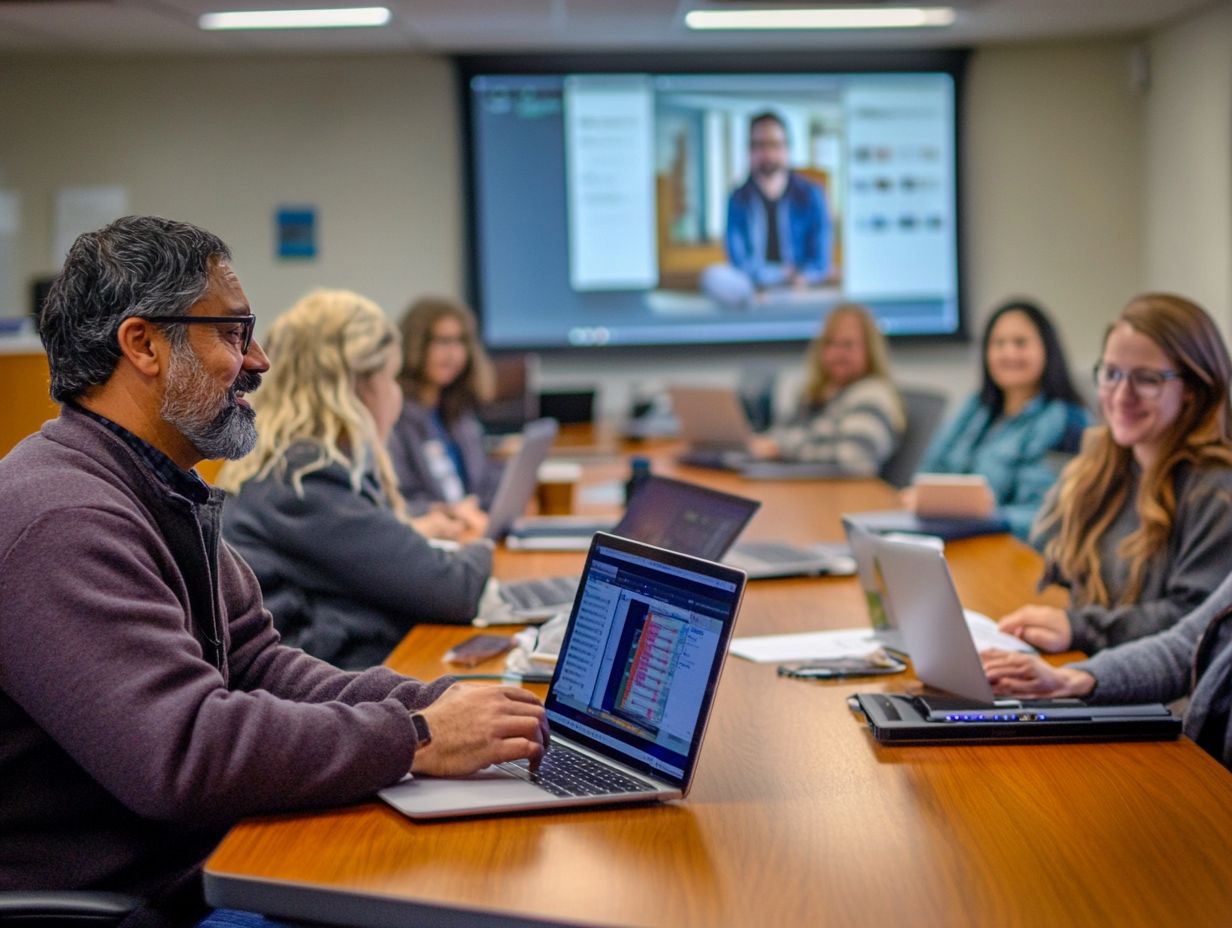
Ensuring student engagement in your online courses is essential for achieving positive learning outcomes, and it hinges on your active participation as an educator.
You can foster this engagement through innovative teaching practices that encourage interaction, such as group discussions and multimedia presentations.
By incorporating interactive assignments, you allow learners to apply concepts in practical ways. This makes the material feel relatable and stimulating. Timely feedback is essential for your students’ success!
As a faculty member, you play a pivotal role in shaping this dynamic. Creating an online atmosphere that promotes participation and collaboration leads to higher levels of student satisfaction and success.
Providing Personalized Support
Providing personalized support is crucial for you as an online faculty member. It fosters student success and ensures that each learner’s needs are met.
By leveraging advanced assessment infrastructure and targeted technology investments, you can monitor student progress and have impactful conversations that drive improvement. For example, utilizing learning analytics tools gives you the power to identify at-risk students early and tailor your feedback to suit their needs.
Implementing regular check-ins through video calls or personalized emails fosters a sense of connection and support.
By tailoring your approach to each student’s style and pace, you create a more engaging and effective educational experience that truly resonates with your students unique journeys.
Effective Strategies for Online Faculty
Implementing effective strategies for online faculty is essential to elevate course development, refine instructional design, and enrich the overall student experience in online education.
By focusing on these aspects, you create a more engaging and impactful learning environment that fosters success for both educators and students alike.
Creating Engaging Course Content
Creating engaging course content is essential for you as an online faculty member, as it directly influences student motivation and learning outcomes. Well-crafted course material captivates your students, igniting their curiosity and fostering a deeper understanding of the subject matter.
Effective instructional design involves a blend of multimedia elements think videos, quizzes, and discussion forums that cater to a variety of learning styles. Faculty development is key here, providing you with the skills necessary to curate and present content in a compelling way.
For instance, employing storytelling techniques transforms abstract theories into relatable scenarios. Interactive assignments encourage your students to actively participate. Additionally, incorporating timely feedback keeps students engaged and reinforces their learning journey, enhancing their overall experience in your course.
Facilitating Meaningful Discussions
Facilitating meaningful discussions in online courses enhances engagement and fosters a deeper understanding of the material. Educators can employ various techniques to create an environment where you feel comfortable sharing your perspectives.
Utilizing effective communication tools like discussion boards and video conferencing platforms cultivates a dynamic atmosphere for interaction. Best practices include establishing clear guidelines for respectful dialogue and encouraging you to respond not just to prompts but also to your peers’ comments.
Setting up dedicated discussion forums for specific topics allows for focused conversations. This supports teaching practices by promoting collaboration and critical thinking, ultimately elevating your overall learning outcomes.
Utilizing Technology for Teaching
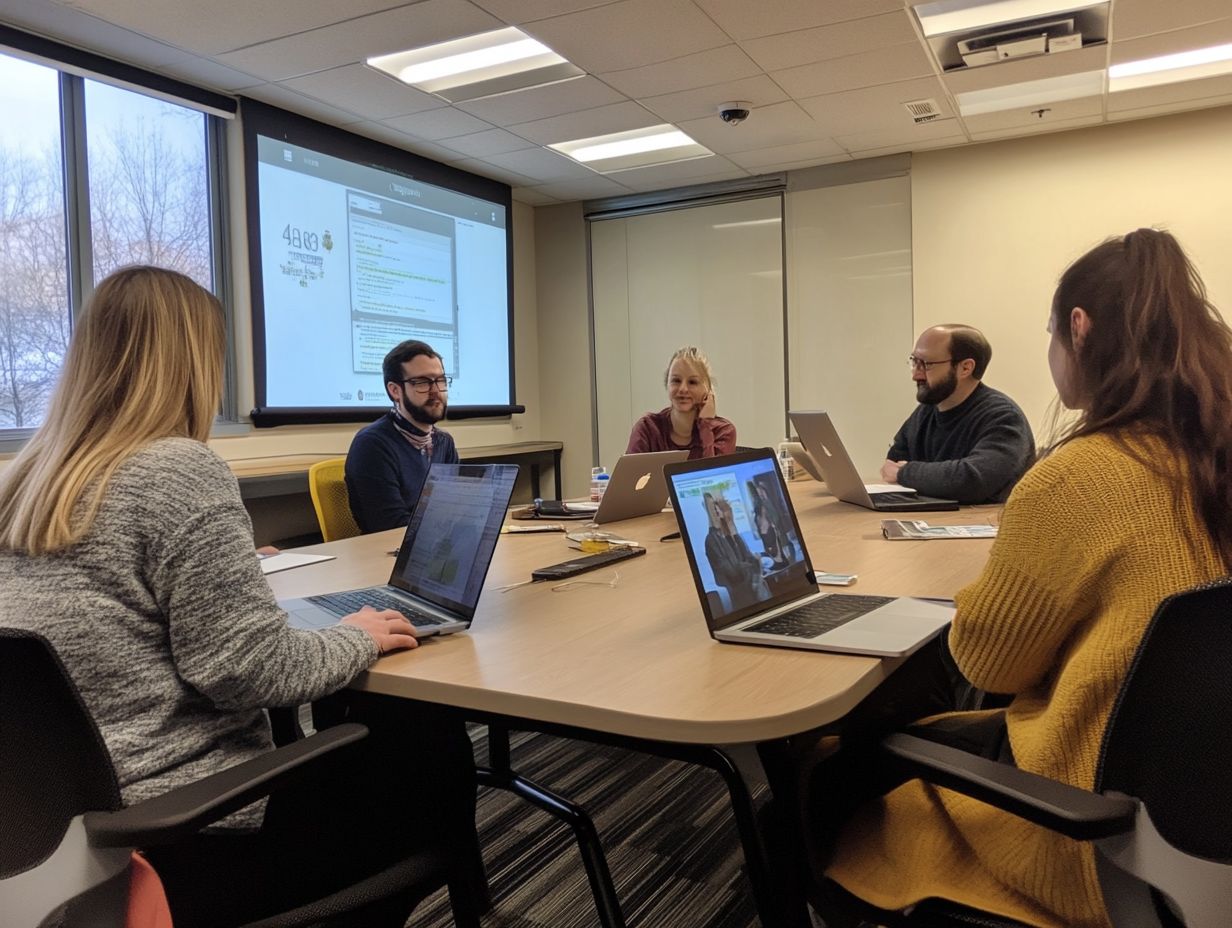
Utilizing technology for teaching is essential for you, as an online faculty member, to create an interactive and efficient learning environment through platforms like Learning Management Systems (LMS).
These systems not only centralize your course materials and track student progress but also incorporate a range of interactive tools, such as discussion forums, video conferencing, and quizzes.
By leveraging technologies like virtual whiteboards and multimedia resources, you can foster collaboration and encourage active participation among your students, significantly enhancing their engagement levels.
The analytics features within these platforms empower you to assess student performance in real-time, allowing for timely interventions and tailored support.
Using educational technology boosts learning outcomes, making it an essential facet of modern online education.
Effective Strategies for Faculty-Student Interaction
Establishing best practices for faculty-student interaction is essential for creating a supportive online learning space.
In this space, students will feel valued and encouraged, paving the way for their success and engagement.
Building Relationships with Students
Building strong relationships with your students is essential for enhancing faculty-student interaction and creating an engaging online education experience. This connection fosters a sense of belonging and promotes open communication, which is vital for effective learning.
As a faculty member, you play a crucial role in this process. By employing strategies such as personalized feedback, regular virtual check-ins, and collaborative group activities, you can make a significant impact. Actively engaging with your students allows you to identify their unique needs and challenges, ensuring that everyone feels supported.
Cultivating an inclusive atmosphere enables students to express their thoughts freely, enriching discussions and reinforcing a sense of community. Ultimately, these relationships lay the foundation for a thriving online learning environment.
Providing Timely and Constructive Feedback
Providing timely and constructive feedback is essential for you, as an online faculty member, to support student success and enhance learning outcomes.
In online education, feedback acts as a guiding light, aiding students in pinpointing their strengths and areas for growth. Effective feedback should be specific, actionable, and delivered in a manner that cultivates a positive learning environment.
By implementing best practices such as using a balanced approach that highlights both accomplishments and opportunities for improvement you can significantly boost student motivation.
Don t miss out! Engage in training focused on assessment techniques to refine your skills. This investment in your professional development ensures that you are equipped with the necessary tools to provide meaningful insights, ultimately helping students evolve and thrive in their academic journeys.
Frequently Asked Questions
What is the role of faculty in online programs?
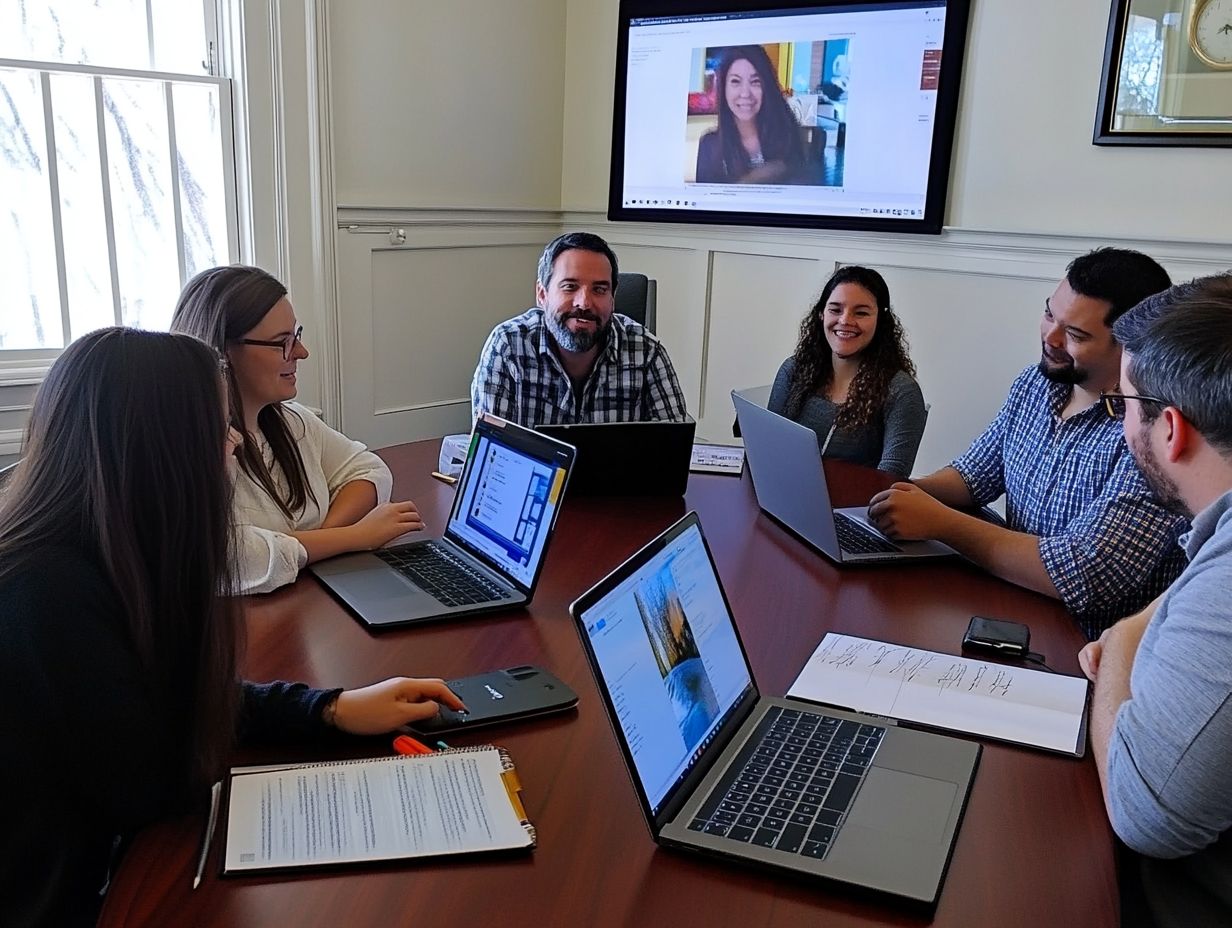
The role of faculty in online programs is to facilitate the learning process. They provide educational materials, engage students in discussions, and check how well students are doing.
Faculty also create a supportive and engaging learning environment for students.
Do online faculty have the same responsibilities as traditional classroom faculty?
Yes, online faculty have similar responsibilities as traditional classroom faculty. They create lesson plans, deliver lectures, and grade assignments.
They may also create and manage online course materials.
How do online faculty communicate with students?
Online faculty typically communicate with students through various online platforms. These include discussion boards, email, and video conferencing.
These methods allow for real-time interactions and support student learning.
What qualifications do online faculty typically have?
Online faculty are usually required to have a higher education degree in the subject they teach. They should also have experience in online teaching.
Additional certifications or training in online education and instructional design may be beneficial.
What is the importance of faculty-student interaction in online programs?
Faculty-student interaction is crucial in online programs. It helps to foster a sense of community and support among students.
This interaction allows for personalized feedback and guidance, enhancing student learning and success.
How do faculty support student success in online programs?
Faculty support student success by providing timely feedback and guidance. They create engaging learning materials and are available for online office hours and discussions.
Their encouragement can truly make a difference in your academic journey!

